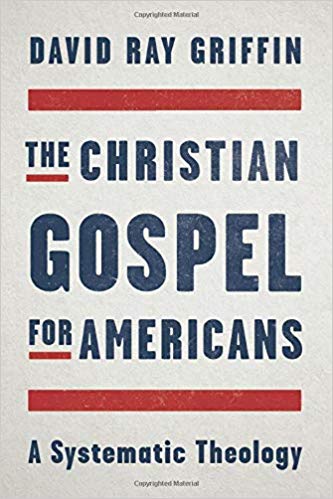“The Christian Gospel for Americans: A Systematic Theology”
A Book Review. This culmination of David Ray Griffin’s life work is a comprehensive, lucid, common-sense theology based on the primary Christian doctrines that date back to the Bible.

It is intended to clearly ground America in its founding identity, and to reset its priorities accordingly.
(The word “gospel” refers to the teachings of Christ. It comes from the old English word god, meaning “good,” and spel, meaning “news, a story,” which was translated from the Latin word for good news, “evangelion.”)
The early primary Christian doctrines are listed in Griffin’s Introduction and each contains good news about the nature, purpose, and justice of the creator.
Later, and not central to the original gospel, came the “bad news” (appearing in secondary and tertiary doctrines), some of which contradicts the essential gospel that God is love.
Having read this book several times, I believe that it does a superb job, in plain English, of what it set out to do:
- to provide a theology specifically for Americans in the 21st century, a theology justified and needed by America’s overwhelming economic, military, and cultural power; and by “the tensions that exist between the American image of itself as a Christian nation and its actual behavior.”
- to understand America in light of what the gospel calls people to do, rather than to interpret the gospel for the convenience of America;
- to encourage the revision of Christian thinking to clearly express the good news contained in the gospel’s primary doctrines;
- to offer a Christian theology which, like philosophy, seeks to provide an all-inclusive worldview, using evidence and reason that is consistent with the facts of our experience;
- to emphasize that at the center of Christianity is the morality of how an individual or a community lives. This morality is based on the words of Jesus: “do to others as you would have them do to you, for this is the law and the prophets.”
Unfortunately, this central moral tenet has been increasingly violated by America’s dark foreign policy under the guise of “American Exceptionalism.”
A theology for America, Griffin says, must deal with this darker side, showing that the American Empire resembles the Roman Empire that crucified Jesus – Jesus, who had resisted economic injustice and foreign imperialism as demonic power opposing the Reign of Divine Values that he proclaimed.
Thucydides stated that “if we cease to rule others, we are in danger of being ruled ourselves.” From this fear emerged the international war system and imperialism, unrestrained by any central moral authority such as a global democracy.
Anyone who ever doubts the unrestrained atrocities and regime changes the US has performed in at least 30 countries, including
Afghanistan, Brazil, Chile, the Congo, Cuba, the Dominican Republic, Ecuador, Greece, Guatemala, Hawaii, Indonesia, Iran, Iraq, Japan, Laos, Libya, Panama, Puerto Rico, the Philippines, Syria, Ukraine, Vietnam, and Yugoslavia,
should read “Chapter Eleven: The American Empire.” This scholarly research is not to be found in American school curricula.
Thus, never-ending wars, promoted domestically by symbols of victory and glory, have institutionalized violence and demonic power as virtuous, especially in the United States. A new theology is needed to extricate America from the grips of a much greater demonic power than that which governed Rome.
The Bible authors dealt with “the politics of fallen creation” – in other words, the politics of demonic power – the same power that now drives America’s “humanitarian” ideology expressed through foreign imperialism, nuclear weapons, environmental degradation, and climate destruction.
This rampage cannot continue without the support of the people. American citizens and their clergy need a sound, internally consistent, systematic theology upon which to ground both their own ethical behavior and the behavior they require of their governments. Griffin’s is the theology they need.
He confronts the science versus religion issue in a fascinating chapter showing that some scientists – former atheists – have been overwhelmed by the exceedingly precise ratios between the elements on Earth that are required for life. These scientists are now saying that the universe was “fine-tuned for life,” thus implying a “fine-tuner” (or divine creator).
For all who have been concerned about the failure of certain traditional Christian teachings to accommodate science, this gift of integrated new theological thinking has risen to meet the challenge.
Better yet, it conveys the positive essence and divine values of Christianity. As such it is a foundational guide for citizens and clergy who wish to deepen their understanding of the original gospel, and to actively promote a peaceful, sustainable existence.
*
Note to readers: please click the share buttons above or below. Forward this article to your email lists. Crosspost on your blog site, internet forums. etc.

